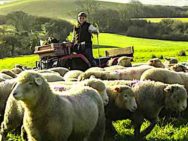It began as a perfectly normal arrangement in communal living, copied by innumerable groups that want to spread the cost of a piece of land amongst several households.
But this particular arrangement between two couples to buy acreage in British Columbia (one of the most favourable places in Canada for off-grid) and live together on it dissolved into an acrimonious court battle involving accusations of uncleanliness and a heated disagreement over chicken butchering.
Following an 11-day trial spread over months, CBS reports, a B.C. Supreme Court judge last week rejected a bid by one of the couples to sue the other for trespass and defamation related to a Facebook posting accusing their former partners of harassment.
Justice Marguerite Church found Callandra Neustater was within her rights to respond to untrue posters spread around Quesnel, B.C., accusing her and husband Jacob of being “police informants” who infiltrated “activist, anarchist, Antifa, anti-pipeline and Indigenous rights groups.”
Instead, Church concluded it was the Neustaters who had been defamed by posters that were either created by or at the direction of Michael McKerracher, who — together with his wife and musical partner Rachel — started the court battle.
An ‘off-the-grid’ alternative lifestyle
The judge’s lengthy ruling tells the story of two couples who purchased 17 hectares of land together in the spring of 2016 in the hopes of starting a new life together in B.C. The Neustaters had been living in Manitoba and the McKerrachers had been living in Saskatchewan, a province they deemed too “conservative” for their “unconventional lifestyle.”
They were both part of a community of “like-minded individuals who promoted and lived an ‘off-the-grid’ alternative lifestyle,” Church wrote.
According to the ruling, the Neustaters met the McKerrachers in 2015 when they travelled together during a western tour by the McKerrachers’ musical act The Grid-Pickers.
“Discussions between the four friends eventually turned to their shared wish to move to British Columbia and they began to discuss their similar interests and the possibility of communal living on jointly owned property,” Church wrote.
They split the cost of a $65,000 property, chose sites for their respective homes and both women became pregnant. Callandra Neustater engaged Rachel McKerracher’s services as a doula.
“For a few months at least, life was good for the two families. Unfortunately, this state of affairs did not last and cracks soon began to appear in their friendship,” the judgment says.
Church said the couples never put their expectations for communal living into writing.
And the two men began arguing.
Michael McKerracher felt “the Neustaters were being controlling by asking him to park his vehicles off the property, not to leave derelict vehicles, and complaining about him having gatherings on his own side and yard site,” the judge wrote.
By contrast, Jacob Neustater felt that “McKerracher wanted things done ‘his way’ and would get upset if the Neustaters disagreed.”
‘If I find …












 Fuelled by a desire to break free from mortgages, rent and commuting; searching for the simple life, in beaches and beauty spots a largely invisible, group are houseless but not homeless. Adam Butterworth, 26, an aeronautical design consultant, and volunteer at the RNLI, decided to live in a van after falling foul of an unscrupulous landlord. He explained: “I was spending £900 a month, nearly half my wages, to rent a one room studio flat that was filled with damp and causing me respiratory problems.
Fuelled by a desire to break free from mortgages, rent and commuting; searching for the simple life, in beaches and beauty spots a largely invisible, group are houseless but not homeless. Adam Butterworth, 26, an aeronautical design consultant, and volunteer at the RNLI, decided to live in a van after falling foul of an unscrupulous landlord. He explained: “I was spending £900 a month, nearly half my wages, to rent a one room studio flat that was filled with damp and causing me respiratory problems.

